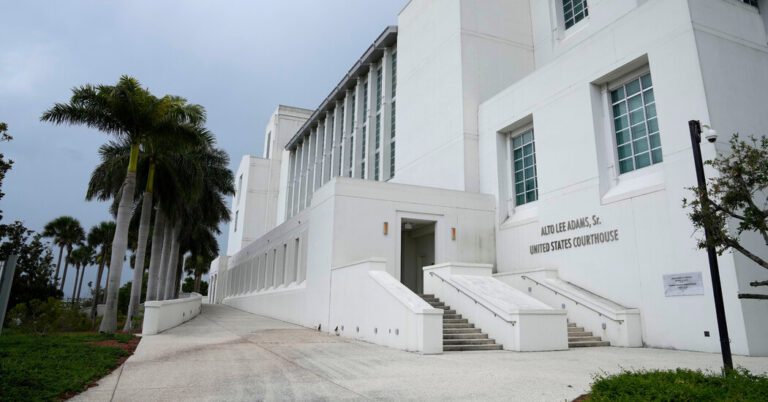
[ad_1]
A federal judge on Thursday rejected for now one of former President Donald J. Trump’s central efforts to dismiss charges that he had mishandled classified documents after leaving office.
The judge, Aileen M. Cannon, ruled that Mr. Trump could not escape prosecution by arguing that he had converted the highly sensitive records he took from the White House into his personal property under a law known as the Presidential Records Act.
In a terse three-page order, Judge Cannon said that the statute, which was put in place after the Watergate scandal to ensure that most records from a president’s time in office remained in the possession of the government, “does not provide a pretrial basis to dismiss” the case.
The decision was a victory of sorts for the special counsel, Jack Smith, who has persistently argued that the Presidential Records Act should have nothing to do with the criminal prosecution of a former president accused of removing national security documents from the White House and then obstructing efforts to retrieve them.
But it may not be the final word on the subject.
Last month, Judge Cannon made a curious request to Mr. Trump’s lawyers and Mr. Smith’s prosecutors, asking them to send her proposed jury instructions about how the Presidential Records Act might affect the central allegation against Mr. Trump: that he took “unauthorized possession” of the documents by removing them from the White House.
Judge Cannon seemed to be exploring the idea that if the act really did permit Mr. Trump to make the documents personal, then he could not be said to have had “unauthorized possession” of them.
But in court papers filed this week, Mr. Smith pushed back hard against that move. He repeated his position that the Presidential Records Act did not permit Mr. Trump to make the documents his own and had absolutely no relevance to the case — even when it came to writing jury instructions.
In his filing, Mr. Smith asked Judge Cannon to follow a normal course of action and decide the legal question of whether the Presidential Records Act was relevant to the case in the context of Mr. Trump’s motion to dismiss, not in conversations about jury instructions. (Jury issues are usually hashed out on the eve of a trial and Judge Cannon has not set a trial date.)
In her ruling on Thursday, Judge Cannon agreed with Mr. Smith that the act was not enough to dismiss the case outright. But she appeared to disagree with him when it came to jury instructions, suggesting that those discussions would continue and that Mr. Trump might eventually be able to raise a Presidential Records Act defense at trial.
Mr. Smith’s demand for the “finalization of jury instructions” before “the presentation of trial defenses and evidence” was “unprecedented and unjust,” she wrote.
Legal experts have expressed concern that if Judge Cannon crafts instructions for the jury based on Mr. Trump’s interpretation of the Presidential Records Act, it could be seen as an attempt to nudge eventual jurors toward an acquittal.
Jury instructions that adopt Mr. Trump’s position on the act could also give the judge sufficient legal wiggle room to acquit Mr. Trump herself at the end of a trial by declaring the government had failed to prove its case.
But in her order, Judge Cannon defended her decision to ask both sides for their dueling takes on jury instructions.
Her request, she wrote, should be interpreted as “a genuine attempt, in the context of the upcoming trial, to better understand the parties’ competing positions and the questions to be submitted to the jury in this complex case of first impression.”
Mr. Trump’s lawyers had first advanced their claims based on the Presidential Records Act in court papers two months ago, arguing that the law allowed him to designate even secretive briefing materials prepared for him by the military and intelligence community as private records that he could do with as he pleased.
But from the start, their position was legally dubious.
Judge Cannon herself balked at the idea during a hearing last month in Federal District Court in Fort Pierce, Fla., telling the lawyers that their expansive interpretation would effectively “gut” the act. And during an earlier stage of the classified documents case, the federal appeals court that sits over the judge agreed, writing that Mr. Trump “neither owns nor has a personal interest in” the documents at issue.
While Judge Cannon’s order was largely silent on the reasons she reached her decision, it could have a follow-on effect on another one of Mr. Trump’s attempts to have the classified document case dismissed.
In a separate motion, Mr. Trump’s lawyers have claimed that he is immune from prosecution for any official acts he took as president. Later this month, the Supreme Court will consider that assertion in the context of Mr. Trump’s other federal case, in which he stands accused of plotting to overturn the 2020 election.
His lawyers have argued that the official act that provides Mr. Trump immunity in the classified documents case is his claimed conversion into personal property, under the Presidential Records Act, of the materials he is charged with removing from the White House.
[ad_2]